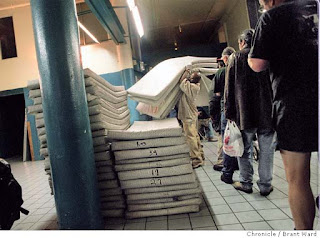
Ehrenreich decides to go to Maine where it was predominantly white and English speaking. She got there by a bus and is lost in this foreign state. She brought clothes, books, shoes, laptop and $1000 that was left from the $1500. While immediately looking for a place to stay she realizes that 30 min away, in Portland is cheaper than where she was at. After looking some more, she finds a tiny cottage for $120 a week. It has everything you need from a TV, to a kitchen, to a bedroom and bathroom. Now that she had a place, she needed a job. She was in Maine in August and due to in being the end of summer, waitressing jobs were really hard to get. She looked for other jobs in different fields such as office helper, but could not do it because of the clothes she had. Ehrenreich realizes after seeing so many hiring ads, she finds that all the jobs are a staggering $6-7 an hour. Its real depressing to have to look so hard for such little pay. After a couple of days, she gets offered two positions, one at a nursing home serving paying $7 and a 40 hour work week that paid $6.65 as a maid.
She decides to take both jobs first starting at nursing home. Thinking that all the menus would be pre-prepared and easy to hand out, she thought wrong. Residents were able to order anything they wanted off the menu. What she found out later that day was her job was to not only to feed them anything they wanted but had to do all the dishes, clean up all food the they dropped on the floor, vacuuming floors, clearing tables and so much more.
Off to the next job as a maid being paid $6.65. She gets an outfit to wear and the rules were: no smoking eating or drinking, or gum chewing. Everyone working there was female except for one and the ages ranging from 20’s to elderly. The maids are sorted out into teams of 2 or 3 and it may differ every day. Since it was her first day she stayed back and had to watch videos for orientation. A week went by a she could not believe how numb she was and how she outworked people that were 20 years younger than her. But of course she says “…our world of pain is managed by Excedrin and Advil compensated for with cigarettes and booze on the weekends.” As she soon realizes working there for a little all the employees are living with extended family members an luckily one are homeless. She finds that one of her employees forgets a sponge at a house and between the two other people in her group, they cannot come up with $2 to buy another one. Getting to know each person there, she realizes there are childcare issues, food problems (not enough), rent and vehicle problems, a never ending battle to sacrificing the solution to one problem to solve another. She is depressed to hear these stories. She hears from another woman that there is pain with her teeth and cannot get in looked at unless she finds free dental care which is almost invincible. She makes a notation to herself and it says, “ If you can’t stand being around suffering people, than you have no business in the low-wage workforce as a journalist or anything else.” I think that was her reality kick to realize how many people around her suffer every day and just cannot do it. It is not fair to people that want to do better but cannot because they can never be above water. So after hard long days at work she goes back home to realize that her cottage is $200 a week since supposedly tourist season has not ended yet and she is short money and now has to go to food pantries and emergency aid.
Back when this book was made the minimum wage was $6.00 and now it is $7.50 in Maine. Clearly that is not an amount that you could live off of. Ehrenreich needed two jobs to barely make it. According to http://www.livingwage.geog.psu.edu/places/2300560545, the living wage in Portland, Maine for one adult and one child is $18.19 an hour, one adult $9.60, two adults $14.09, two adults one child $22.64. These are some facts that are stated for this particular city.
http://www.seacoastonline.com/articles/20080924-BIZ-809240309




